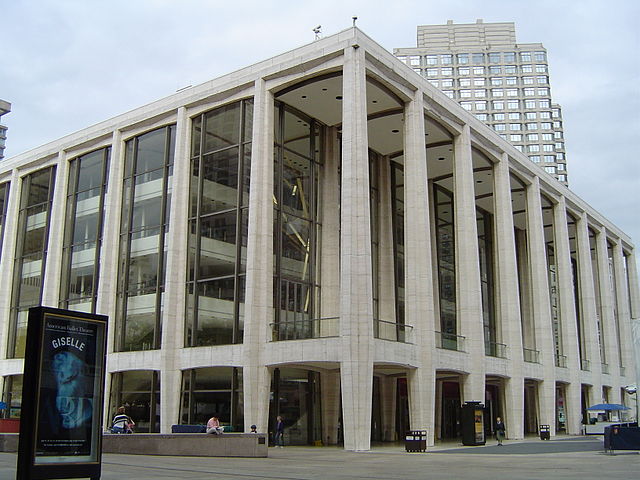According to Jewish philosopher Maimonides, there are eight levels of charity, each varying by degrees of disclosure, willingness, and contribution. The highest level listed is helping one’s neighbor until he or she is no longer dependent on others. The second highest level is when one “give[s] to the poor without knowing to whom one gives.” A little bit lower on the list is “when one gives to the poor person after being asked.” (h/t Reich/Eisinger). So where would Maimonides place the recent fiasco at Lincoln Center?
Lincoln Center, the performing arts complex at the heart of Manhattan, was founded in the mid-twentieth century and prominently houses the Metropolitan Opera House, the David H. Koch Theater (formerly the New York State Theater), and Avery Fisher Hall (formerly Philharmonic Hall), along with a number of other plazas, studios, and theaters. Avery Fisher Hall, named for a music philanthropist who donated $10 million in 1973 to support the building, seats just under 3,000 and has been a centerpiece of American musical history for the past half-century. Late last week, however, the New York Times reported that Lincoln Center is all set to rename the landmark --- but not without threatened legal action and serious negotiation.
Months earlier, the philharmonic and Lincoln Center started preparations for a major renovation to the Avery Fisher Hall, expected to cost $500 million. According to the Times, the Fisher family (i.e., Avery Fisher’s children and grandchildren) “threatened legal action if the concert hall was rebuilt or renovated under a new name.” Lincoln Center was then put in an interesting position –- on the one hand, they must honor donor intent and preserve the name “Avery Fisher Hall” (in this case, it is donor intent because the original agreement including naming); on the other hand, raising a half-billion dollars without the leverage of negotiating naming rights is implausible and impractical.
So how did the Fishers and Lincoln Center – to borrow a phrase from Lincoln Center chairwoman Katherine G. Farley – “untie the Gordian knot?” Turning back to the Times:
Lincoln Center is essentially paying the family $15 million for permission to drop the name and has included several other inducements, like a promise to feature prominent tributes to Mr. Fisher in the new lobby of the concert hall.
Immediately responding to this agreement, Charles Avery Fisher stated: “We feel, at the end of the day, that our father would have wanted this as well.” To translate, Charles Avery Fisher is arguing that his father, the music philanthropist, would have wanted to take a cut from charitable donations going to support music in order to protect his name --- a position that is unpopular, yet entirely justifiable. After all, in fairness to the Fisher family, it is worth noting that $15 million today is less than one third of Fisher’s original donation is 1973, adjusted for inflation.
While there has not yet been abundant commentary on this latest development, initial analysis from “The Philanthropy Edition” of Slate Money was rather harsh. Host Felix Salmon of Fusion and guests Jesse Eisinger of ProPublica and Professor Rob Reich of Stanford seemed to agree on the implications of the Lincoln Center agreement. Calling this a sort of “transactional philanthropy,” Salmon argued, “It’s just a bunch of self-aggrandizing money.” Eisinger concurred with this sentiment, noting, “It doesn’t have much to do with philanthropy when it’s . . . improving your social standing.” In sum, their argument alleges that the naming process, in this case, is no longer a means of gratitude, but rather a reduction of charitable philanthropy to "selling reputation."
On the one hand, the position presented by the commentators at Slate is on to something: the issue here is entirely about holding on to one’s name. This position is not to say that the Fisher heirs are without reason; instead, the family’s position merely connotes a ROI-dominated motivation (viz., without the benefits accrued from naming, giving is no longer profitable). On the other hand, however, it becomes just as easy to sympathize with the Fisher family position: the original donor provided the grant with the naming stipulation and the proposed renovations would likely violate that agreement.
Nonetheless, there are two significant takeaways from this case. First, the case at Lincoln Center cements the phenomenon of “selling a name,” which thereby supplants the process of naming as gratitude. This is nothing new – John Harvard, Cornelius Vanderbilt, and Andrew Carnegie could provide additional examples of giving what Forbes labeled a few years back “moniker money.” At Lincoln Center, this norm is simply being affirmed. Second, the Lincoln Center case creates a precedent of a sort of interim investment. In this case, Lincoln Center used the interim investment from Avery Fisher until it was no longer necessary and time to upgrade. This phenomenon, contrary to name-selling, is rather novel. Only time will tell if this type of temporary giving develops into a common philanthropic practice.
Although the Lincoln Center agreement is beneficial to all parties involved, this “transactional philanthropy” influences the very nature of “philanthropy” far more than popular commentary has yet realized.







Avery Fisher was the kind of person who was humble, and all about the music and its community and continuity. I don’t think he would have raised issue with it– he was too great a man to make something like this the object of his focus or concern. Yet, I can’t help but feel, in our day, that this is rather insulting a thing to do. Also an egotistic thing to replace a great name like Fisher’s with ones own. It is generous to build up the music hall yes–but I cannot imagine how one would even dream of replacing so great a name as Fisher with one’s own! It may be the difference between modern generations and the greatest generation—but my values are found largely in the former. Avery Fisher will always be the greatest human being and patron of the musical arts in my opinion. That dove with a note in its beak spoke of a spiritual dimension to the matters of making and reproducing music. I hope we haven’t lost it.